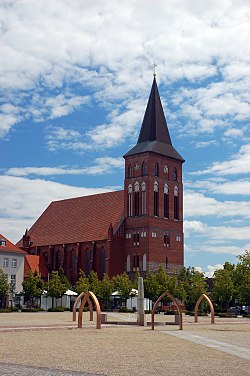Pasewalk
Town in Mecklenburg-Vorpommern, Germany From Wikipedia, the free encyclopedia
Town in Mecklenburg-Vorpommern, Germany From Wikipedia, the free encyclopedia
Pasewalk (German: [ˈpaːzəvalk] ) is a town in the Vorpommern-Greifswald district, in the state of Mecklenburg-Vorpommern in Germany. Located on the Uecker river, it is the capital of the former Uecker-Randow district, and the seat of the Uecker-Randow-Tal Amt, of which it is not part.
Pasewalk | |
|---|---|
 St. Mary in the center of Pasewalk | |
| Coordinates: 53°30′N 14°00′E | |
| Country | Germany |
| State | Mecklenburg-Vorpommern |
| District | Vorpommern-Greifswald |
| Government | |
| • Mayor | Danny Rodewald (Ind.) |
| Area | |
| • Total | 54.99 km2 (21.23 sq mi) |
| Elevation | 15 m (49 ft) |
| Population (2022-12-31)[1] | |
| • Total | 9,811 |
| • Density | 180/km2 (460/sq mi) |
| Time zone | UTC+01:00 (CET) |
| • Summer (DST) | UTC+02:00 (CEST) |
| Postal codes | 17309 |
| Dialling codes | 03973 |
| Vehicle registration | VG, PW |
| Website | pasewalk |
Pasewalk became a town during the 12th century and was soon a member of the Hanseatic League. In 1359 it passed to the Duke of Pomerania. Frequently ravaged during the wars which devastated the district, it was plundered several times by Imperial troops during the Thirty Years' War. In 1657 it was burned down by the Poles and in 1713 by the Russians. In the Peace of Westphalia in 1648 it was given to Sweden, but in 1676 it was conquered by Brandenburg. In 1720, in the Peace of Stockholm, it was finally assigned to Brandenburg-Prussia. It was part to the Prussian Province of Pomerania from 1720 until 1945.
The town is famous for having been surrendered to the French without a fight during the War of the Fourth Coalition, despite them being far less numerous than the defenders of the city. On the day World War I ended, Adolf Hitler, the future dictator of Nazi Germany, was being treated here after being wounded by a gas attack. During the Battle of Berlin, part of World War II, Pasewalk was captured by troops of the 2nd Belorussian Front of the Red Army on 28 April 1945. From 1945 to 1952, Pasewalk was part of the State of Mecklenburg-Vorpommern, from 1952 to 1990 of the Bezirk Neubrandenburg of East Germany and since 1990 again of Mecklenburg-Vorpommern.
|
|
|

Köppen-Geiger climate classification system classifies its climate as oceanic (Cfb).[12]
| Climate data for Pasewalk | |||||||||||||
|---|---|---|---|---|---|---|---|---|---|---|---|---|---|
| Month | Jan | Feb | Mar | Apr | May | Jun | Jul | Aug | Sep | Oct | Nov | Dec | Year |
| Mean daily maximum °C (°F) | 1.1 (34.0) |
2.1 (35.8) |
6.9 (44.4) |
12.6 (54.7) |
18 (64) |
21.5 (70.7) |
22.8 (73.0) |
22.6 (72.7) |
18.6 (65.5) |
12.8 (55.0) |
6.9 (44.4) |
3 (37) |
12.4 (54.3) |
| Daily mean °C (°F) | −1.3 (29.7) |
−0.6 (30.9) |
3.4 (38.1) |
8.2 (46.8) |
13 (55) |
16.6 (61.9) |
18.2 (64.8) |
17.8 (64.0) |
14.3 (57.7) |
9.6 (49.3) |
4.5 (40.1) |
0.9 (33.6) |
8.7 (47.7) |
| Mean daily minimum °C (°F) | −3.6 (25.5) |
−3.3 (26.1) |
0 (32) |
3.8 (38.8) |
8 (46) |
11.7 (53.1) |
13.6 (56.5) |
13.1 (55.6) |
10.1 (50.2) |
6.5 (43.7) |
2.1 (35.8) |
−1.2 (29.8) |
5.1 (41.1) |
| Average precipitation mm (inches) | 38 (1.5) |
29 (1.1) |
33 (1.3) |
38 (1.5) |
51 (2.0) |
60 (2.4) |
63 (2.5) |
57 (2.2) |
48 (1.9) |
41 (1.6) |
45 (1.8) |
44 (1.7) |
547 (21.5) |
| Source: Climate-Data.org (altitude: 16m)[12] | |||||||||||||
Seamless Wikipedia browsing. On steroids.
Every time you click a link to Wikipedia, Wiktionary or Wikiquote in your browser's search results, it will show the modern Wikiwand interface.
Wikiwand extension is a five stars, simple, with minimum permission required to keep your browsing private, safe and transparent.